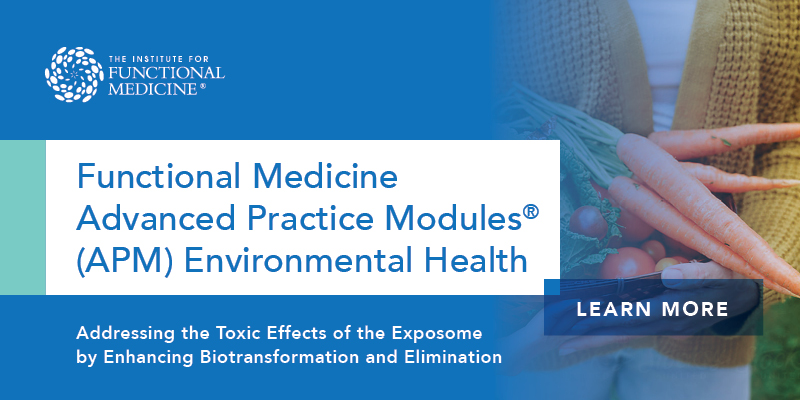Environmental Health 2024 Conference
Livestream
- Up to 18.5 CME Credits Available
- Live Q&A with presenters
This module will review the foundational biochemistry and genetics of biotransformation pathways, connect organ system dysfunctions to potential toxic exposures, and detail the available laboratory evaluations useful in assessing both the toxic load and physiologic responses to toxicant and toxin exposures. This program also uses a case-based, integrated approach to effectively deliver tools necessary for clinicians to diagnose and treat the toxic component of their patients’ total health pictures.
+ What will you learn at the Environmental Health conference
- Understand the synergistic effects of both toxicants and toxins and identify potential toxic exposures as the antecedents and mediators of chronic, systemic diseases.
- Integrate clinical point-of-care tools to effectively evaluate patterns of toxicity and monitor patient progress.
- Recognize and address five clinical patterns of chronic toxicity and their effects on neurological, immunological, mitochondrial, hormonal function and carcinogenesis.
- Recognize the influence of socioeconomic determinants of health (SDOH's) and mental, emotional, spiritual factors in an individual's susceptibility to toxin and toxicant exposure.
- Recognize and evaluate the most important root causes and contributors of toxic load, including impaired biotransformation, impaired elimination, and nutritional deficiencies.
- Order and interpret laboratory evaluations of toxic load and biotransformation capacity.
- Maximize physical exam findings and conventional laboratory results to assess toxic load and burden.
- Apply nutritional support, toxicant reduction techniques, therapeutic detoxification regimens, and other individualized approaches to decrease total toxic load.
- Apply various nutraceuticals, botanicals, pharmaceuticals, and lifestyle interventions to increase the mobilization, biotransformation, and elimination of toxic compounds.
+ Join In-Person & Stay in the IFM Room Block
Why book in the IFM room block:
- We only choose hotels who meet our standard for service with quality gluten and dairy free offerings in their catering and room service menus and through the outlets in the hotel.
- Hotel room rates for future IFM programs are determined by the total room nights booked at the previous programs. You can help IFM secure excellent hotel locations and affordable room rates for future programs by booking your room through our room block.
- Please beware of other sites posting as IFM-affiliated and encouraging you to book a hotel via their website. The only way to ensure you are booking a room in the IFM room block is via the link or phone number listed above.
IFM Room Block Rate: $289 +tax
Cutoff for Special Room Rate: Wednesday, September 4, 2024
Click to book hotel room at the IFM room block >
Click for general hotel information >
- Please book with the link above or call the hotel at 312.638.6686 and request the group rate for Institute for Functional Medicine.
- *Rooms in the block are limited and may sell out prior to the cutoff date.
- All charges incurred, including room, tax, and incidental charges are to be paid upon checkout.
- Please beware of other sites posting as IFM-affiliated and encouraging you to book a hotel via their website. The only way to ensure you are booking a room in the IFM room block is via the link or phone number listed above.
+ Exhibit & Sponsorship Opportunities
View the 2024 Core Program Exhibitor Prospectus for details on exhibit and sponsorship opportunities. For any questions or to discuss further, please contact the IFM Exhibiting Manager at exhibiting@ifm.org.
Environmental Health: Insights & Education
Biotransformation Pathways & Toxic Exposures
We have learned a great deal in recent years about how toxicants and toxins affect us, where they originate, and how to improve our ability to detoxify. Understanding toxicity and taking practical steps to improve biotransformation and elimination of toxicants are essential and critical pieces in any integrative approach to a patient’s health and well-being.
Explore more below about the biochemistry and genetics of biotransformation pathways, connections of organ system dysfunctions to potential toxic exposures, available laboratory evaluations useful in working up a toxin-exposed patient, and various treatment approaches.
.

Environmental Health Related Articles
Who is AFMCP designed for?
IFM encourages a multidisciplinary approach to patient care. We welcome a variety of licensed healthcare disciplines to AFMCP, including MDs, DOs, NDs, DCs, physician assistants, nursing professionals, and nutrition professionals.
Can I take another course before taking AFMCP?
Many learners find taking AFMCP first helps them to understand IFM’s proprietary tools, such as the Functional Medicine Matrix, and provides context for the skills, processes, and science behind incorporating Functional Medicine principles into practice. The course is offered multiple times each year in order to meet the needs of clinicians wishing to begin their IFM education with AFMCP. However, AFMCP is not a prerequisite to take any IFM course if you are comfortable with the material to be presented.
Will I be certified as a Functional Medicine practitioner after attending AFMCP?
No. AFMCP is one of seven required courses in the IFM Certification Program. In addition to AFMCP, you must complete the six Advanced Practice Modules as required coursework for the IFM Certification Program.
Will I be listed on the Find A Practitioner search after I attend AFMCP?
After attending AFMCP, you will be eligible to list your profile in our Find A Practitioner search as long as you are also enrolled in the IFM Membership Program. Before your profile is listed, however, you must fill in your practice information within your account profile to activate your profile to appear in the search.

Improving Liver Function
Nutrient support to the liver can help reduce the body’s overall toxic burden.

Microplastics & Menarche
Endocrine disrupting chemicals can lead to reproductive health abnormalities.

Probiotics & Heavy Metals
Probiotic support to the gut microbiome may help mitigate heavy metal toxicity.

Health Risks of PFAS
Browse the latest data and clinical suggestions surrounding (PFAS) forever chemicals.

Common Toxic Exposures
Pesticides and a variety of other environmental chemicals contribute to dysfunction.

Pollutants & Bone Health
Environmental toxicants may reduce bone health and increase osteoporosis risk.

Learn About IFM's Experts on Environmental Health
Attendee Testimonials
This course was very well put together with all-encompassing information about environmental health. All data presented is evidence-based and includes information on how nutrition can help support these processes. The lecturers are knowledgeable and excellent speakers.
Environmental Health 2023 Attendee
The Environmental Health course has been a game-changer for my practice. It's enriched my expertise, improved my communication and collaboration skills, and allowed me to deliver more personalized and effective care. I'm now better equipped to contribute to my patients' healthcare teams, working in harmony with fellow professionals to optimize patient care and outcomes.
Environmental Health 2023 Attendee
This module helped me understand at a physiologic level, the reasons why we should avoid common toxins that are often talked about and why it is important to avoid them (prioritizing eating organic, clean personal care products). Often times you hear this advice being given without a clear explanation of how it impacts our overall health.
Environmental Health 2023 Attendee
Join Functional Medicine Newsletter
Sign up for IFM's weekly newsletter to receive functional medicine news and insights on topics such as nutrition, common conditions you see in your practice, and improving patient compliance.*



.jpg?width=721&height=424&name=Infographic_Environmental%20Health_horizontal-02%20(1).jpg)
.jpg?width=1043&height=382&name=Infographic_Environmental%20Health_horizontal-01%20(2).jpg)




